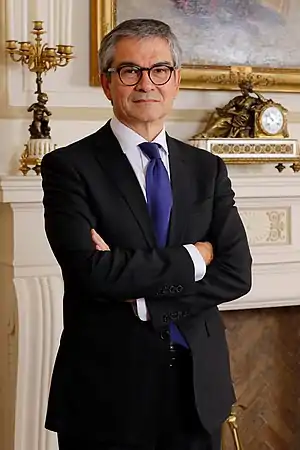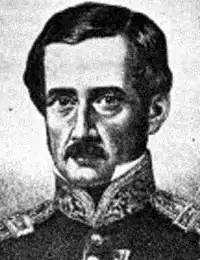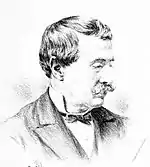Ministry of Finance (Chile)
The Ministry of Finance of Chile (Spanish: Ministerio de Hacienda) is the cabinet-level administrative office in charge of managing the financial affairs, fiscal policy, and capital markets of Chile; planning, directing, coordinating, executing, controlling and informing all financial policies formulated by the President of Chile.

Since March 2022, the Minister of Finance is Mario Marcel.
History
In 1814 the Secretary of Finance was created, as Supreme Director Bernardo O'Higgins sought to develop an administrative framework for the then newly formed nation, considering the need to ascertain its independence from the Spanish crown.[1] The office was first organized by a Presidential Decree on 2 June 1817, and was named "Secretariat of Finance" (1818 - 1824). Hipólito de Villegas was appointed to lead the new institution.[1] The present structure, duties and attributions were defined by Presidential Decree N° 7912, "General Law of Ministries", on 30 November 1927.
Institutional framework
According to Article 6 of Decree 7,912 of 1927, the Ministry of Finance responsibilities include, among other:[2]
- Management of State's financial policy
- Collection and administration of public revenue
- Public accounting
- Study of custom policy and intervention in trade agreements
- Issues concerning monetary laws, banks and credit institutions
- Issues concerning corporation oversight, stock exchange and insurance
- Everything related to public credit and the presentation in Congress of projects affecting public finance
- The development and technical study of the Budget of the Nation and investment account
In practice, the Ministry of Finance executes policies through several related and dependent institutions.
Related Institutions:[3]
- BancoEstado
- Government Procurement Directorate
- Civil Service Directorate
- National Customs Service
- Internal Tax Service
- Public Purchasing and Recruiting Department
- Superintendency of Banks and Financial Institutions
- Superintendency of Securities and Insurance
- Superintendency of Game Casinos
- Financial Analysis Unit
Dependent Institutions:[4]
- Budget Office
- General Treasury of the Republic
Policies
One of Chile's fiscal policy central features has been its counter-cyclical nature. This has been facilitated by the voluntary application since 2001 of a structural balance policy based on the commitment to an announced goal of a medium-term structural balance as a percentage of GDP.[5] The structural balance nets out the effect of the economic cycle (including copper price volatility) on fiscal revenues and constrains expenditures to a correspondingly consistent level. In practice, this means that expenditures rise when economic activity is low and decrease in booms.[6] The target was of 1% of GDP between 2001 and 2007, it was reduced to 0.5% in 2008 and then to 0% in 2009 in the wake of the global financial crisis[7] In 2005, key elements of this voluntary policy were incorporated into legislation through the Fiscal Responsibility Law (Law 20,128).[6]
However, the financial crisis of 2008 together with the reconstruction following the 2010 Chile earthquake undermined the financial position of the country, resulting in a structural deficit that was reduced to 1/2 percent of GDP in 2012, two years ahead of government expectations to pass the 1% threshold.[6][8] The 2013 budget was devised with a target structural deficit of 1%.[9]
The Fiscal Responsibility Law also allowed for the creation of two sovereign wealth funds: the Pension Reserve Fund (PRF) and the Economic and Social Stabilization Fund (ESSF). The PRF was created as a response to the expected increase in liabilities related to old-age pensions and benefits, especially for the poor,[6][10] and it had accumulated US$5.883 million (market value) by the end of 2012.[11] The PRF is set to receive yearly capital injections between 0.2% and 0.5% of the previous year's GDP depending on the fiscal surplus, so new resources are secured every year.[12] The ESSF's objective is to stabilize fiscal spending by providing funds to finance fiscal deficits and debt amortization[10] and had market value of US$14.998 million by the end of year 2012.[11] Each year, the ESSF accumulates any fiscal surplus remaining after the contributions to the FRP and to the capital of the Central Bank of Chile, excluding debt service and anticipatory contributions during the previous year.[13] The funds are managed by the Central Bank of Chile and a Financial Committee advises on their investment policy.[10] Chile also participated in the discussion and agreed to the Santiago Principles.[10]
The main taxes in Chile in terms of revenue collection are the value added tax (45.8% of total revenues in 2012) and the income tax (41.8% of total revenues in 2012).[14] The value added tax is levied on sales of goods and services (including imports) at a rate of 19%, with a few exemptions. The income tax revenue comprises different taxes. While there is a corporate income tax of 20% over profits from companies (called First Category Tax), the system is ultimately designed to tax individuals. Therefore, corporate income taxes paid constitute a credit towards two personal income taxes: the Global Complementary Tax (in the case of residents) or the Additional Tax (in the case of non-residents). The Global Complementary Tax is payable by those that have different sources of income, while those receiving income solely from dependent work are subject to the Second Category Tax. Both taxes are equally progressive in statutory terms, with a top marginal rate of 40%. Income arising from corporate activity under the Global Complementary Tax only becomes payable when effectively distributed to the individual. There are also special sales taxes on alcohol and luxury goods, as well as specific taxes on tobacco and fuel. Other taxes include the inheritance tax and custom duties.[15]
In 2012, general government expenditure reached 21.5% of GDP, while revenues were equivalent to 22% of GDP.[5] Gross financial debt amounted to 12.2% of GDP, while in net terms it was of -6.9% of GDP, both well below OECD averages.[5]
Chile's prudent fiscal policy along with low debt levels have been cited as contributing factors to Chile's exceptionally high credit rating in the context of the region.[16] Chile's AA- S&P rating is the highest in the Latin America, while Fitch Ratings places the country one step below, in A+.[17]
List of ministers of finance
Patria Vieja period
| Picture | Name | Entered office | Exited office | Notes | Appointed by |
| José María Villareal | 14 March 1814 | 23 July 1814 | Secretary of Government | Francisco de la Lastra | |
 |
Bernardo de Vera y Pintado | 23 July 1814 | 10 August 1814 | Secretary of Government and Finance | Government Junta |
 |
Manuel Rodríguez Erdoyza | 10 August 1814 | 2 October 1814 | Secretary of Government and Finance | |
Ministers of finance
| Picture | Name | Entered office | Exited office | Notes | Appointed by |
 |
Hipólito de Villegas y Fernández | 7 September 1817 | 30 March 1818 | Bernardo O'Higgins | |
| Anselmo de la Cruz y Bahamonde | 30 March 1818 | 14 April 1818 | |||
| José Miguel Infante y Rojas | 14 April 1818 | 27 June 1818 | |||
| Anselmo de la Cruz y Bahamonde | 27 June 1818 | 2 May 1820 | |||
| José Antonio Rodríguez Aldea | 2 May 1820 | 28 January 1823 | |||
 |
Agustín Vial Santelices | 28 January 1823 | 8 April 1823 | Government Junta | |
| Pedro Nolasco Mena y Ramírez Rivilla | 8 April 1823 | 12 July 1823 | Ramón Freire | ||
 |
Diego José Benavente Bustamante | 12 July 1823 | 22 February 1825 | ||
| José Ignacio Eyzaguirre Arechavala | 22 February 1825 | 18 June 1825 | |||
| Rafael Correa de Saa Lazón | 18 June 1825 | 8 October 1825 | |||
 |
Diego José Benavente Bustamante | 8 October 1825 | 17 October 1825 | ||
 |
Manuel José Gandarillas Guzmán | 17 October 1825 | 9 September 1826 | ||
 |
Agustín Vial Santelices | 12 September 1826 | 20 October 1826 | Agustín Eyzaguirre | |
| Melchor de Santiago Concha y Cerda | 20 October 1826 | 22 October 1826 | |||
| Ventura Blanco Encalada | 8 March 1827 | 23 July 1828 | Reappointed | Ramón Freire | |
 |
Francisco Ruiz-Tagle Portales | 23 July 1828 | 16 July 1829 | Francisco Antonio Pinto | |
| Manuel José Huici | 16 July 1829 | 9 November 1829 | Francisco Ramón Vicuña | ||
| Pedro José Prado Montaner | 9 November 1829 | 7 December 1829 | |||
 |
Mariano Egaña Fabres | 20 February 1830 | 18 March 1830 | Francisco Ruiz-Tagle | |
 |
Juan Francisco Meneses Echanes | 18 March 1830 | 15 June 1830 | ||
 |
Manuel Rengifo Cárdenas | 15 June 1830 | 9 November 1835 | José Tomás Ovalle | |
 |
Joaquín Tocornal Jiménez | 9 November 1835 | 14 April 1841 | José Joaquín Prieto | |
| Rafael Correa de Saa Lazón | 14 April 1841 | 18 September 1841 | |||
 |
Manuel Rengifo Cárdenas | 18 September 1841 | 10 April 1845 | Manuel Bulnes | |
 |
José Joaquín Pérez Mascayano | 10 April 1845 | 22 September 1846 | ||
 |
Manuel Camilo Vial Formas | 22 September 1846 | 9 May 1848 | Interim | |
| Salvador Sanfuentes Torres | 9 May 1848 | 12 June 1849 | Interim | ||
| Antonio García Reyes | 12 June 1849 | 19 April 1850 | |||
 |
Jerónimo Urmeneta García-Abello | 19 April 1850 | 7 May 1852 | Appointed by | |
| Reappointed by | Manuel Montt | ||||
| José Guillermo Waddington Urrutia | 7 May 1852 | 7 January 1854 | |||
| José María Berganza Lorca | 7 January 1854 | 18 September 1856 | Interim | ||
 |
José Francisco Gana López | 18 September 1856 | 31 October 1856 | Interim | |
| Alejandro Vial Guzmán | 31 October 1856 | 29 September 1857 | |||
| Francisco de Borja Solar Gorostiaga | 29 September 1857 | 8 January 1858 | |||
| Matías Ovalle Errázuriz | 8 January 1858 | 3 October 1859 | |||
| Jovino Novoa Vidal | 3 October 1859 | 1 October 1861 | |||
| Manuel Rengifo Vial | 1 October 1861 | 9 July 1862 | José Joaquín Pérez | ||
 |
José Victorino Lastarria Santander | 9 July 1862 | 16 January 1863 | ||
 |
Domingo Santa María González | 16 January 1863 | 10 May 1864 | ||
| Alejandro Reyes Cotapos | 10 May 1864 | 7 January 1869 | |||
 |
Melchor de Concha y Toro | 7 January 1869 | 2 August 1870 | ||
| José Antonio Gandarillas Luco | 2 August 1870 | 18 September 1871 | |||
| Camilo Cobo Gutiérrez | 18 September 1871 | 12 April 1872 | Federico Errázuriz Zañartu | ||
 |
Ramón Barros Luco | 12 April 1872 | 18 September 1876 | ||
 |
Rafael Sotomayor Baeza | 18 September 1876 | 27 October 1877 | Aníbal Pinto | |
 |
Augusto Matte Pérez | 27 October 1877 | 5 August 1878 | ||
 |
Julio Zegers Samaniego | 5 August 1878 | 17 April 1879 | ||
 |
Augusto Matte Pérez | 17 April 1879 | 16 June 1880 | ||
| José Alfonso Cavada | 16 June 1880 | 18 September 1881 | |||
| Luis Aldunate Carrera | 18 September 1881 | 25 April 1882 | Domingo Santa María | ||
 |
Pedro Lucio Cuadra Luque | 25 April 1882 | 18 January 1884 | ||
 |
Ramón Barros Luco | 18 January 1884 | 5 September 1885 | ||
| Pedro Nolasco Gandarillas Luco | 5 September 1885 | 13 October 1885 | |||
 |
Hermógenes Pérez de Arce Lopetegui | 13 October 1885 | 18 September 1886 | ||
| Agustín Edwards Ross | 18 September 1886 | 13 April 1888 | José Manuel Balmaceda | ||
 |
Enrique Salvador Sanfuentes Andonaegui | 13 April 1888 | 2 November 1888 | ||
| Justiniano Sotomayor Guzmán | 2 November 1888 | 11 June 1889 | |||
| Juan de Dios Vial Guzmán | 11 June 1889 | 23 October 1889 | |||
 |
Pedro Montt Montt | 23 October 1889 | 21 January 1890 | ||
| Pedro Nolasco Gandarillas Luco | 21 January 1890 | 7 August 1890 | |||
| Manuel Salustio Fernández Pradel | 7 August 1890 | 15 October 1890 | |||
| Lauro Barros Valdés | 15 October 1890 | 26 December 1890 | |||
| Anfión Muñoz Muñoz | 26 December 1890 | 5 January 1891 | |||
| Ismael Pérez Montt | 27 December 1890 | 5 January 1891 | Interim | ||
| José Miguel Valdés Carrera | 5 January 1891 | 29 March 1891 | |||
 |
Manuel Arístides Zañartu Zañartu | 29 March 1891 | 29 July 1891 | ||
 |
Manuel José Yrarrázaval Larraín | 29 July 1891 | 29 August 1891 | ||
 |
Joaquín Walker Martínez | 7 September 1891 | 26 December 1891 | Revolutionary Junta of Iquique | |
| Francisco Valdes Vergara | 26 December 1891 | 14 March 1892 | Jorge Montt | ||
| Agustin Edwards Ross | 14 March 1892 | 9 July 1892 | |||
 |
Enrique Mac Iver | 9 July 1892 | 22 April 1893 | ||
| Alejandro Vial Guzmán | 22 April 1893 | 26 April 1894 | |||
| Carlos Riesco Errázuriz | 26 April 1894 | 7 December 1894 | |||
| Manuel Salustio Fernández | 7 December 1894 | 1 August 1895 | |||
 |
Enrique Mac Iver | 1 August 1895 | 24 November 1895 | ||
 |
Hermógenes Pérez de Arce Lopetegui | 24 November 1895 | 18 September 1896 | ||
| José Francisco Fabres | 18 September 1896 | 20 November 1896 | Federico Errázuriz Echaurren | ||
| Justiniano Sotomayor Guzmán | 20 November 1896 | 26 June 1897 | |||
| Juan Enrique Tocornal | 26 June 1897 | 25 August 1897 | |||
| Elías Fernández Albano | 25 August 1897 | 23 December 1897 | |||
| Alberto González Errázuriz | 23 December 1897 | 14 April 1898 | |||
 |
Darío Zañartu del Río | 14 April 1898 | 28 June 1898 | ||
 |
Rafael Sotomayor Gaete | 28 June 1898 | 27 June 1899 | ||
 |
Manuel Salinas González | 27 June 1899 | 14 October 1900 | ||
 |
Ramón Santelices Cuevas | 14 October 1900 | 3 November 1900 | ||
| Nicolás González Errázuriz | 3 November 1900 | 15 March 1901 | |||
| Manuel Fernández García | 15 March 1901 | 1 May 1901 | |||
 |
Juan Luis Sanfuentes Andonaegui | 1 May 1901 | 3 October 1901 | ||
 |
Luis Barros Borgoño | 3 October 1901 | 18 November 1901 | Germán Riesco | |
 |
Enrique Villegas Encalada | 18 November 1901 | 6 May 1902 | ||
 |
Guillermo Barros Jara | 6 May 1902 | 20 November 1902 | ||
 |
Ricardo Cruzat Hurtado | 20 November 1902 | 7 April 1903 | ||
 |
Manuel Salinas González | 7 April 1903 | 1 September 1903 | ||
| Miguel Cruchaga Tocornal | 1 September 1903 | 10 January 1904 | |||
 |
Ramón Santelices Cuevas | 10 January 1904 | 12 April 1904 | ||
 |
Guillermo Barros Jara | 12 April 1904 | 12 May 1904 | ||
| Maximiliano Ibáñez | 12 May 1904 | 30 October 1904 | |||
| Ernesto Hübner Bermúdez | 30 October 1904 | 18 March 1905 | |||
 |
Antonio Subercaseaux Pérez | 18 March 1905 | 21 October 1905 | ||
| Belfor Fernández | 21 October 1905 | 19 March 1906 | |||
 |
Ramón Santelices Cuevas | 19 March 1906 | 7 May 1906 | ||
| Joaquín Prieto Hurtado | 7 May 1906 | 18 September 1906 | |||
| José Raimundo del Río Soto Aguilar | 18 September 1906 | 29 October 1906 | Pedro Montt | ||
 |
Rafael Sotomayor Gaete | 29 October 1906 | 12 June 1907 | ||
 |
Ramón Subercaseaux Pérez | 12 June 1907 | 25 October 1907 | ||
| Enrique A. Rodríguez | 25 October 1907 | 29 August 1908 | |||
| Pedro Nicolás Montenegro Onel | 29 August 1908 | 22 January 1909 | |||
| Luis Devoto A. | 22 January 1909 | 15 June 1909 | |||
 |
Joaquín Figueroa Larraín | 15 June 1909 | 15 September 1909 | ||
 |
Manuel Salinas González | 15 September 1909 | 25 June 1910 | ||
 |
Carlos Balmaceda Saavedra | 25 June 1910 | 23 December 1910 | ||
| José Raimundo del Río Soto Aguilar | 23 December 1910 | 11 January 1911 | Ramón Barros Luco | ||
| Roberto Sánchez García de la Huerta | 11 April 1911 | 15 August 1911 | |||
| Pedro Nicolás Montenegro Onel | 15 August 1911 | 20 May 1912 | |||
| Samuel Claro Lastarria | 20 May 1912 | 8 August 1912 | |||
 |
Manuel Rivas Vicuña | 8 August 1912 | 8 April 1913 | ||
| Pedro García de la Huerta Izquierdo | 8 August 1913 | 16 June 1913 | |||
 |
Arturo Alessandri Palma | 16 June 1913 | 17 November 1913 | ||
| Ricardo Salas Edwards | 17 November 1913 | 3 September 1914 | |||
| Alfredo Barros Errázuriz | 3 September 1914 | 6 September 1914 | |||
 |
Enrique Oyarzún Mondaca | 6 September 1914 | 15 September 1914 | ||
| Alberto Edwards Argandoña | 15 September 1914 | 15 December 1915 | |||
| Manuel García de la Huerta | 15 December 1915 | 23 December 1915 | |||
 |
Ramón Santelices Cuevas | 23 December 1915 | 8 January 1916 | PC | Juan Luis Sanfuentes |
| Armando Quezada Acharán | 8 January 1916 | 1 July 1916 | PR | ||
| Luis Devoto Arrizaga | 1 July 1916 | 20 November 1916 | PLD | ||
.jpg.webp) |
Arturo Prat Carvajal | 20 November 1916 | 14 July 1917 | PN | |
| Armando Quezada Acharán | 14 July 1917 | 12 October 1917 | PR | ||
| Ricardo Salas Edwards | 12 October 1917 | 18 January 1918 | PC | ||
| Manuel Hederra Concha | 18 January 1918 | 27 April 1918 | PN | ||
 |
Luis Claro Solar | 27 April 1918 | 6 September 1918 | PL | |
| Luis Aníbal Barrios | 6 September 1918 | 25 November 1918 | PR | ||
 |
Luis Claro Solar | 25 November 1918 | 9 July 1919 | PL | |
| Julio Philippi Bihl | 9 July 1919 | 8 November 1919 | |||
 |
Ramón Subercaseaux Pérez | 8 November 1919 | 26 March 1920 | PNa | |
 |
Enrique Oyarzún Mondaca | 26 March 1920 | 16 June 1920 | PR | |
| Antonio Viera Gallo | 16 June 1920 | 1 July 1920 | PN | ||
| Francisco Garcés Gana | 1 July 1920 | 23 December 1920 | PL | ||
| Daniel Martner | 23 December 1920 | 12 May 1921 | PR | Arturo Alessandri | |
 |
Enrique Oyarzún Mondaca | 12 May 1921 | 16 August 1921 | ||
| Víctor R. Celis Maturana | 16 August 1921 | 3 November 1921 | |||
| Francisco Garcés Gana | 3 November 1921 | 22 March 1922 | PL | ||
 |
Galvarino Gallardo Nieto | 22 March 1922 | 1 April 1922 | PR | |
| Samuel Claro Lastarria | 1 April 1922 | 29 August 1922 | PL | ||
| Guillermo Edwards Matte | 29 August 1922 | 21 December 1922 | |||
| Ricardo Valdés Bustamante | 21 December 1922 | 12 January 1923 | |||
| Aníbal Rodríguez Herrera | 12 January 1923 | 16 March 1923 | PN | ||
| Víctor R. Celis Maturana | 16 March 1923 | 14 June 1923 | PR | ||
| Agustín Correa Bravo | 14 June 1923 | 2 July 1923 | PLD | ||
 |
Ramón Subercaseaux Pérez | 2 July 1923 | 3 January 1924 | PN | |
 |
Enrique Zañartu Prieto | 3 January 1924 | 1 February 1924 | PLD | |
| Samuel Claro Lastarria | 1 February 1924 | 14 March 1924 | PL | ||
| Belfor Fernández Rodríguez | 14 March 1924 | 20 July 1924 | PLD | ||
 |
Enrique Zañartu Prieto | 20 July 1924 | 5 September 1924 | PLD | |
- PAL - Partido Agrario Laborista
- PC - Partido Conservador
- PCCh - Partido Comunista de Chile
- PCSC - Partido Conservador Social Cristiano
- PCU - Partido Conservador Unido
- PDC - Partido Democrata Cristiano
- Ind - Independiente
- PL - Partido Liberal
- PLD - Partido Liberal Democrático
- MAPU - Movimiento de Acción Popular Unitaria
- PN - Partido Nacional
- PNa - Partido Unión Nacionalista
- PR - Partido Radical
- PRDe - Partido Radical Democrático
- PS - Partido Socialista
Sources
- República de Chile (1942). "VI. Poder Ejecutivo - Nómina de Gobernantes, Presidentes y Ministros desde la Independencia.". Manual del Senado. 1810-1942 (PDF) (in Spanish). Santiago de Chile: Imprenta Universitaria.
- Valencia Avaria, Luis (1986). Anales de la República: textos constitucionales de Chile y registro de los ciudadanos que han integrado los poderes ejecutivo y legislativo desde 1810 (in Spanish) (2ª edición ed.). Santiago de Chile: Editorial Andrés Bello.
References
- Ministry of Finance website, History.
- Decree 7,912 (in Spanish), LeyChile.
- Ministry of Finance of Chile website, Related institutions (in Spanish)
- Ministry of Finance of Chile website, Dependent institutions (in Spanish)
- OECD (2013), OECD Economic Surveys: Chile 2013. OECD Publishing.
- Rodríguez, J., C. Tokman and A. Vega (2007). “Structural balance policy in Chile". OECD Journal on Budgeting 7(2), pp.59-92.
- Corbo, Vittorio. La política fiscal chilena. Blogs from El Mercurio Newspaper. 25 August 2013.
- Chile 2013 Article IV Consultation, IMF Country Report No. 13/198, International Monetary Fund, July 2013.
- IMF Executive Board Concludes 2013 Article IV Consultation with Chile, Public Information Notice (PIN) No. 13/77, International Monetary Fund, 8 July 2013.
- "Ministry of Finance of Chile website, Sovereign Wealth Funds, About the Funds". Archived from the original on 13 June 2015. Retrieved 20 December 2013.
- "Ministry of Finance of Chile, Sovereign Wealth Funds Annual Report 2012 (in Spanish)". Archived from the original on 13 June 2015. Retrieved 20 December 2013.
- "Ministry of Finance of Chile website, Sovereign Wealth Funds, Pension Reserve Fund". Archived from the original on 20 December 2013. Retrieved 20 December 2013.
- Ministry of Finance of Chile website, Sovereign Wealth Funds, Economic and Social Stabilization Fund.
- Internal Tax Service (Servicio de Impuestos Internos) website, Statistics, Annual tax revenue 2009-2012 (in Spanish)
- Internal Tax Service (Servicio de Impuestos Internos) website, Chilean Taxation Archived 26 February 2015 at the Wayback Machine
- RPT-Fitch affirms Chile's FC IDR at 'A+'; outlook stable, Reuters, 25 October 2013.
- Sebastian Boyd, “Chile Raised to 4th-Highest Rating at Standard & Poor’s". Bloomberg News, 26 December 2012.
External links
- [Official website (in Spanish)